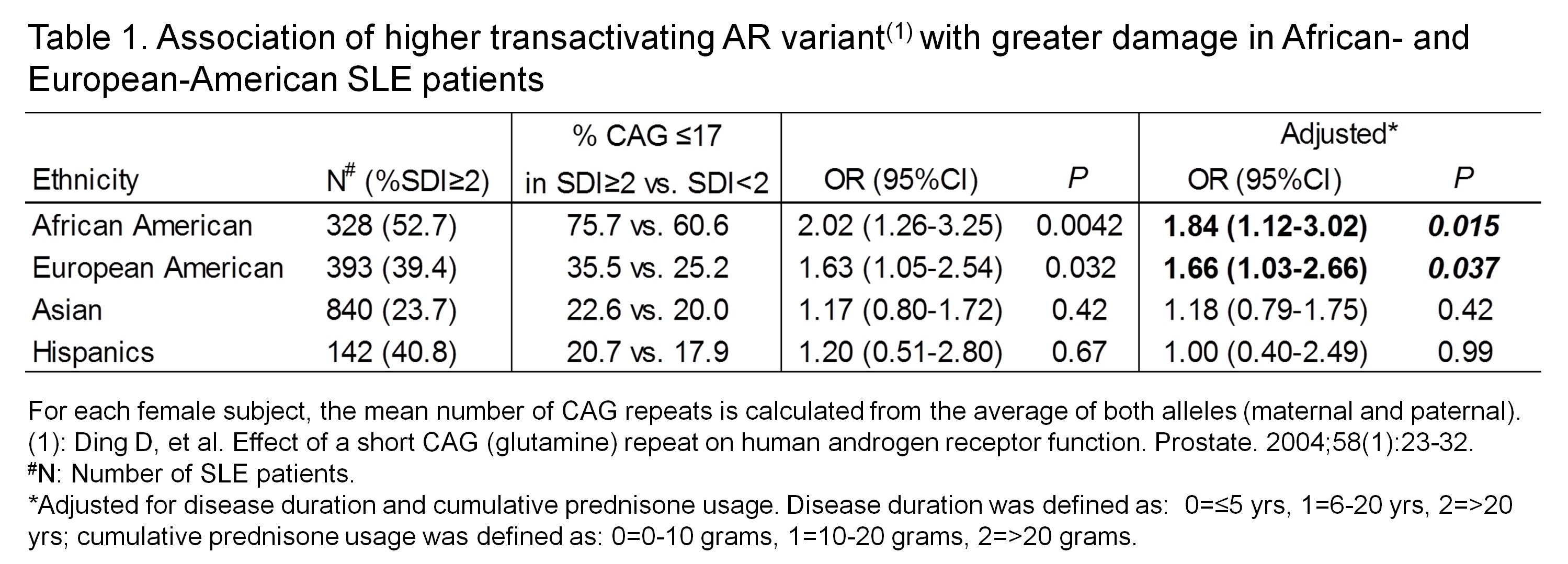Session Information
Date: Monday, November 9, 2015
Title: Systemic Lupus Erythematosus - Human Etiology and Pathogenesis Poster II
Session Type: ACR Poster Session B
Session Time: 9:00AM-11:00AM
Background/Purpose :
Organ damage predicts physical
disability and mortality of SLE. Given that men with SLE tend to develop
accelerated damage, we selected an X-linked androgen receptor (AR) variant, the
short CAG repeat encoding ≤17 copies of polyglutamine that confers enhanced
receptor-mediated transcriptional activity associated with more maleness, to
test for association with damage in 1,703 (213 male and 1,490 female) SLE
patients recruited at multiple centers with mean (±SD) disease duration of 10
(±7.9) years.
Methods:
Association of damage assessed by the
SLICC/ACR Damage Index (SDI) with clinical features (gender, ethnicity, age at
diagnosis, disease duration and cumulative exposure to glucocorticoids) and/or
CAG repeat length (genotyped by PCR) were analyzed using univariate and
multivariate regression tests.
Results:
Risk factors identified by univariate
analysis associated with greater damage (defined as SDI≥2) were male gender,
longer disease duration, higher cumulative prednisone usage and African
American (AA) ancestry compared to European American (EA); Asian ancestry
protected against damage. Except male gender, all other factors were confirmed
in the multivariate model of greater damage: longer disease duration (OR
[95%CI] =2.08 [1.72-2.51], P=5.0E-14), higher cumulative prednisone
usage (1.49 [1.28-1.75], P=6.8E-07), AA ancestry (1.99 [1.44-2.74], P=2.5E-05),
and Asian ancestry (0.32 [0.23-0.44], P=1.6E-11). After adjusting for
these covariates, the short CAG repeat (≤17) was associated with greater damage
in AA (ORadj=1.84 [1.12-3.02], Padj=0.015) and EA
patients (ORadj=1.66 [1.03-2.66], Padj=0.037)
(Table 1). This genetic association remained statistically significant in AA
women and there was a trend toward significance in EA women. Compared to EA/AA
patients, fewer proportions of Asians had damage and short CAG repeat and
Hispanics (HS) had smaller sample size, contributing to no genetic association.
Renal damage defined by SDI (observed in 12.7% patients) was associated with
male gender (OR=1.76 [1.18-2.62], P=0.006), younger age at diagnosis
(OR=1.65 [1.08-2.50], P=0.02), longer disease duration (OR=1.50
[1.16-1.96], P=0.002), higher prednisone usage (OR=1.60 [1.29-2.00], P=3.0E-05),
AA (OR=5.09 [3.09-8.37], P=1.5E-10) and HS (OR=2.83 [1.54-5.20], P=0.001)
ancestries. The short CAG repeat was associated with renal damage in AA
patients only (ORadj=1.91 [1.04-3.51], Padj=0.038).
Conclusion:
In addition to confirming previously
reported risk factors for damage accrual in SLE, we identified short CAG
repeats with an enhanced AR transactivation activity to be associated with
greater damage in EA and female AA SLE patients and renal damage in AA
patients. Our data supports genetic contribution, including a role of X-linked
androgen receptor-mediated activity, to organ damage in SLE of multiple
ancestries.
To cite this abstract in AMA style:
Deng Y, Grossman JM, Fu Q, Martin WJ, James JA, Merrill JT, Kamen DL, Gilkeson GS, Boackle SA, Putterman C, Salmon JE, Kyttaris VC, Tsokos GC, Quirk M, Kamble S, Barcelona M, Magdangal E, Sahakian L, Lee SY, Lin TY, Chen W, Woo JMP, Rullo OJ, McCurdy DK, Hahn BH, McMahon MA, Bae SC, Tsao BP. Functional Androgen Receptor Variants Associated with Greater Damage in Systemic Lupus Erythematosus [abstract]. Arthritis Rheumatol. 2015; 67 (suppl 10). https://acrabstracts.org/abstract/functional-androgen-receptor-variants-associated-with-greater-damage-in-systemic-lupus-erythematosus/. Accessed .« Back to 2015 ACR/ARHP Annual Meeting
ACR Meeting Abstracts - https://acrabstracts.org/abstract/functional-androgen-receptor-variants-associated-with-greater-damage-in-systemic-lupus-erythematosus/

